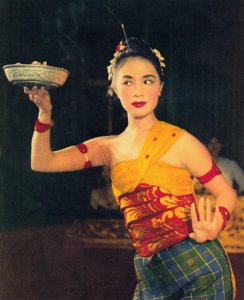Presented By: Confucius Institute at the University of Michigan
Performing Bandung: China’s Dance Diplomacy with India, Indonesia, and Burma, 1953-1962
Presented by Emily Wilcox, Assistant Professor of Modern Chinese Studies, U-M

While dance was a common element of international diplomacy activities around the world during the 1950s and early 1960s, scholars have only recently begun to focus attention on this topic, especially as it concerns relationships forged beyond those of the Cold War superpowers. Using previously unexamined historical materials such as rare photographs and performance programs, dancer biographies, autobiographies and personal interviews, unpublished institutional histories, and contemporary periodicals, this article demonstrates not only that dance was an integral part of China’s inter-Asian cultural exchange between 1953 and 1962, but also that the PRC developed a distinct approach to dance diplomacy. Through a series of exchanges with India, Indonesia, and Burma, China’s foreign ministers and dancers developed and refined a method of dance diplomacy in which the primary goal was to learn from, rather than export to, these neighboring countries. This approach harnessed the affective power of embodied aesthetic culture to literally “perform” Bandung ideals, namely, cooperation and mutual respect among Asian nations and an anti-imperialist cultural stance. Through the establishment in 1962 of the Oriental Song and Dance Ensemble, the PRC institutionalized this model of dance diplomacy, expanding it to include the entire Third World. Bandung-era dance diplomacy initiatives of the 1950s and early 1960s not only supported important new international alliances and political movements, but also asserted China’s self-identity as part of the East in a way that challenged Eurocentric ideals previously entrenched in China’s domestic dance field.
About the speaker:
Emily Wilcox is Assistant Professor of Modern Chinese Studies in the Department of Asian Languages and Cultures at the University of Michigan. She is a specialist in Chinese performance culture, especially dance. Dr. Wilcox co-curated the 2017 exhibition “Chinese Dance: National Movements in a Revolutionary Age, 1945-1965.” She is the author of numerous articles and has written a forthcoming book tracing the history of concert dance in the People’s Republic of China.
About the speaker:
Emily Wilcox is Assistant Professor of Modern Chinese Studies in the Department of Asian Languages and Cultures at the University of Michigan. She is a specialist in Chinese performance culture, especially dance. Dr. Wilcox co-curated the 2017 exhibition “Chinese Dance: National Movements in a Revolutionary Age, 1945-1965.” She is the author of numerous articles and has written a forthcoming book tracing the history of concert dance in the People’s Republic of China.